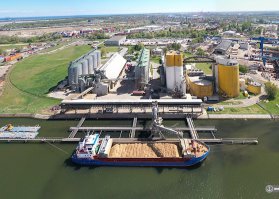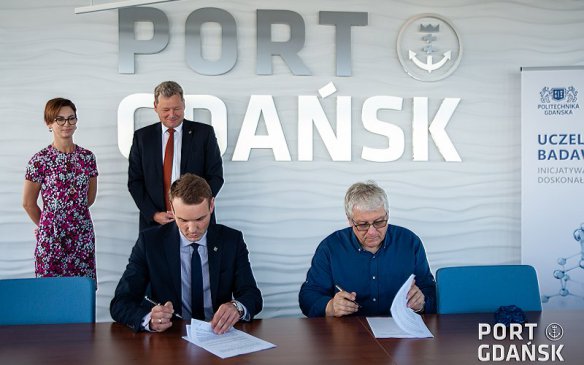The Port of Gdansk has advanced to the group of leading European ports

In spite of the impact of the global crisis and the ongoing pandemic, in the 1st half of 2020 the Port of Gdansk advanced to the group of the top 20 European ports, outstripping the ports in Genoa and Dunkirk.
In the 1st half of 2020, the Port of Gdansk handled 23.3 million tonnes, which is a decrease by 15.2% compared to the same period of 2019. Comparing the first six months of 2020 to the previous year, the transshipments of grain (+188.8%), other bulk cargo (+10%), and ore (+1127%) increased.
The following year-on-year decreases were recorded in the remaining cargo groups: fuels (-33.4%), coal (-23.7%), general cargo (-3.6%), containers (-4.1%), Ro-Ro (-40.1%), and timber (-98.1%). The transshipment structure in the 1st half of 2020 was as follows: liquid bulk cargo: 29.6%, dry bulk cargo: 23.9%, general cargo: 46.5%.
"We have tripled our transshipment volume within the last decade. We should remember that in 2019, a record amount of 52 million tonnes were handled at our port. Even if the effects of the epidemic continue, the correction will be minor here. We have not had a single idle day in terms of commodity flow since the beginning of the pandemic. The Port of Gdansk is a strategic "import window" for the country’s economy, in particular with the import of fuels and coal, the demand for which dropped, causing decreases in transshipments. We are a universal port and we are able to make up for the decreases with other cargo groups. Our smaller operators, functioning at the Inner Port, respond to the changing situation in a definitely more flexible manner, thus making good the losses of the largest, specialised terminals," says Adam Klos, Commercial Director at the Port of Gdansk.
In spite of the decrease in the transshipment volume in the 1st and 2nd quarters, the Port of Gdansk may experience a rebound in the 3rd and 4th quarters due to the role of maritime transport as the primary carrier of international trade. The crisis in the maritime industry is likely to be short-lived and commercial vessels will begin to fill the supply gaps in the immediate term. In the period between January and June of 2020, the number of commercial vessel calls at the Port of Gdansk was 1,476, which was a slight decrease compared to the same period of 2019. At the same time, a lower average ship gross volume was recorded in 2020 (20,057 GT/ship) than in 2019, primarily due to the lower number of calls of ocean container ships and large tankers in the 1st and 2nd quarters of 2020.
The predominant transshipment group in the 1st half of 2020 was still general cargo, which came up to 10,984,740 tonnes within this period. In spite of the reopening of the Chinese economy, the lack of demand in Europe and the USA made the situation in the container transport market worse in the 1st half of 2020. Despite the decrease in the container transshipment volume in the 1st half of 2020, the Port of Gdansk still ranks second in the Baltic Sea in this category. We should add that since the beginning of the year, we have been observing increased transshipments of bananas at the Port of Gdansk, with more handled from January till June 2020 than within the entire year 2019, having achieved a result of nearly 90,000 tonnes.
What is worth noting is the fact that in the 1st half of 2020, a year-on year increase of +1127% in the transshipment of ore was recorded, with 63,385 tonnes handled.
Since the beginning of the year, we have also been recording higher monthly grain transshipment volumes. Grain is a cargo group recording the largest year-on-year increases after the 1st half of the year. In spite of the coronavirus pandemic, traffic never stops at the Port of Gdansk, where after summing up grain transshipments to date, a result of 609,250 tonnes was recorded after the first six months, which is 188.8% more than in the same period of 2019.
Following the first half of the year, the Port of Gdansk still ranks fourth in the Baltic Sea, outstripping the Port of Klaipeda, which closed the first half of the year with a result of 22.1 million tonnes (-6.6% year on year). The Port of Gdansk’s share in handling Poland’s exchange of goods by sea remains at a high level, having come to 46% in the first half of 2020, which is the best result among the Polish ports.
Media contact:
Anna Drozd – Spokesperson
e-mail: anna.drozd@portgdansk.pl
phone: +48 727 064 605




